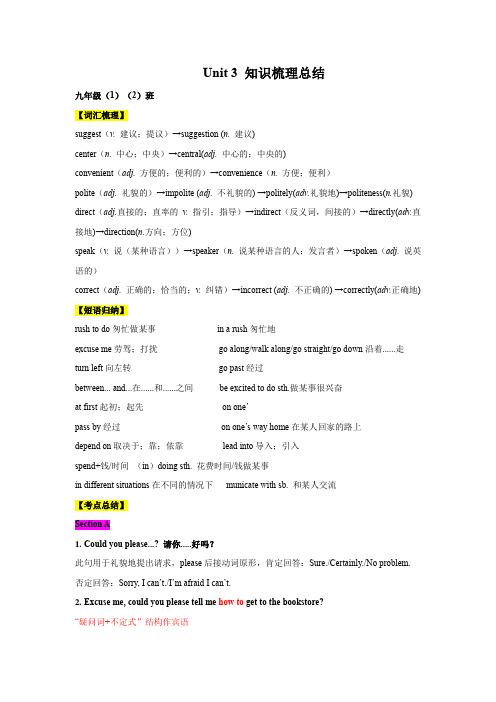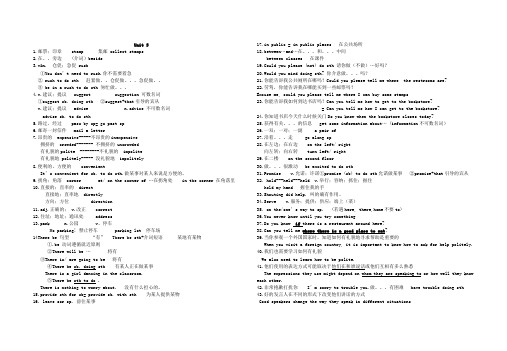初中英语 人教版九年级第三单元知识点梳理
人教版九年级英语第三单元知识点梳理

人教版九年级英语第三单元知识点梳理Unit 3 Could you please tell me where the restrooms are?一、短语:1.make a telephone call打电话2.save money省钱、存钱3.from time to time时常、有时4.turn red变红5.take up开始做6.deal with对付、应付7.go straight向前直走8.tons of attention很多关注9.on the beach在海滩上10.be careful当心11.hang out闲逛12.in a way在某种程度上13.dress up as打扮成14.a very small number of…极少数的…15.be alone独处16.give a speech做演讲二、知识点:1.①问路常用的句子:Do you know where is…?你知道...在哪里吗?Can you tell me how can I get to…?你能告诉我我如何能到达...吗?Could you tell me how to get to…?你能告诉我如何到达...吗?②Can/Could/Will/Would you please tell me sth?你能告诉我某事吗?(表示十分客气地询问)③Could you tell me how to get to the park?你能告诉我怎么去公园吗?上面句子中的how to get to the park是疑问词与动词不定式连用,用作宾语,但不是宾语从句,相当于how I can get to the park(宾语从句)。
2.日常交际用语:①take the elevator/escalator to the…floor:乘电梯/自动扶梯到…楼。
②turn left/right=take a left/right:向左/右转。
九年级英语人教版unit3笔记

九年级英语人教版unit3笔记一、重点单词。
1. restroom.- n.(美)洗手间;公共厕所。
例如:I need to find a restroom quickly.(我需要快速找到一个洗手间。
)2. stamp.- n. 邮票;印章。
如:He collects stamps as a hobby.(他把收集邮票当作一种爱好。
)- v. 跺脚;盖章。
例如:She stamped her foot angrily.(她生气地跺了跺脚。
)3. bookstore.- n. 书店。
I bought this book at the bookstore yesterday.(我昨天在这家书店买了这本书。
)4. beside.- prep. 在……旁边;在……附近。
The park is beside the river.(公园在河边。
)5. postcard.- n. 明信片。
He sent me a postcard from Paris.(他从巴黎给我寄了一张明信片。
)6. pardon.- v. 原谅;请再说一遍。
Pardon me, I didn't catch your words.(对不起,我没听清你的话。
)- n. 原谅;宽恕。
I beg your pardon for being late.(请原谅我迟到了。
)7. washroom.- n. 洗手间;厕所(同restroom,比较口语化)。
Can you tell me where the washroom is?(你能告诉我洗手间在哪里吗?)8. bathroom.- n. 浴室;洗手间。
There is a bathtub in the bathroom.(浴室里有一个浴缸。
)9. normal.- adj. 正常的;一般的。
It's normal to feel nervous before an exam.(考试前感到紧张是正常的。
Unit3笔记人教版英语九年级全册

Unit 3 知识梳理总结九年级(1)(2)班【词汇梳理】suggest(v.建议;提议)→suggestion (n. 建议)center(n.中心;中央)→central(adj.中心的;中央的)convenient(adj. 方便的;便利的)→convenience(n. 方便;便利)polite(adj.礼貌的)→impolite (adj. 不礼貌的) →politely(adv.礼貌地)→politeness(n.礼貌) direct(adj.直接的;直率的v. 指引;指导)→indirect(反义词,间接的)→directly(adv.直接地)→direction(n.方向;方位)speak(v.说(某种语言))→speaker(n.说某种语言的人;发言者)→spoken(adj.说英语的)correct(adj.正确的;恰当的;v.纠错)→incorrect (adj. 不正确的) →correctly(adv.正确地)【短语归纳】rush to do匆忙做某事in a rush匆忙地excuse me劳驾;打扰go along/walk along/go straight/go down沿着......走turn left向左转go past经过between... and...在......和......之间be excited to do sth.做某事很兴奋at first起初;起先on one’pass by经过on one’s way home在某人回家的路上depend on取决于;靠;依靠lead into导入;引入spend+钱/时间(in)doing sth. 花费时间/钱做某事in different situations在不同的情况下municate with sb. 和某人交流【考点总结】Section A1.Could you please...? 请你.....好吗?此句用于礼貌地提出请求,please后接动词原形,肯定回答:Sure./Certainly./No problem.否定回答:Sorry, I can’t./I’m afraid I can’t.2.Excuse me, could you please tell me how to get to the bookstore?“疑问词+不定式”结构作宾语①how to do e.g. Please tell me how to deal with these old books.②what to do e.g. Could you please tell me what to do next.③when to do e.g. We haven’t decided when to start.3.问路及指路的表达方式.问路:Could you please tell me the way to...?Where is...?Do you know if there is a ... near here?Can you tell me how I can get to...?指路:Go along/Walk alone/Go down the street until...Turn left at the second turning/crossing.4.The bookstore is on your right, beside the bank.beside (prep.) 在......旁边;在.....附近 e.g. The bookstore is beside the mall.besides (prep.) 除.....之外(还)... e.g. We also like chemistry besides physics.5.You don’t need to rush.(1)作动词,意为“仓促;匆忙行事”rush out of冲出rush into 冲进......里(2)作名词,意为“仓促;匆忙”in a rush仓促;匆忙作名词,还可意为“特别忙碌的时期”at the rush hour在(交通)高峰期6.I was scared at first, but shouting did help.在英语中,通常把助动词do/does/did放在动词原形前,用以加强语气,意为“真的;的确”。
Unit3重点知识人教版九年级英语全册

九年级Unit3重点知识一词形词块拓展① normal adj. 正常的→ normally 正常地② suggest v. 建议→ suggestion n. 建议,提议suggest doing sth. 建议做某事give sb. suggestions 给予某人建议③ center n.中心,中央→ central adj. 中心的;中央的④fascinate v. 使....入迷→ fascinating adj.迷人的,极有吸引力的⑤expensive adj. 昂贵的→ inexpensive adj. 不昂贵的⑥crowd v.挤满n. 人群,观众→ crowded adj.拥挤的→ uncrowded adj.不拥挤的,人少的⑦convenient adj. 便利的,方便的→ convenience n. 方便,便利,适宜,省事It's convenient for sb. to do sth. 对某人来说做某事是便利的sth. is convenient to/for sb. 对某人来说做某事是便利的⑧polite adj. →impolite adj.不礼貌的,粗鲁的→ politely adv. 礼貌地,客气地sound impolite 听起来不礼貌⑨direct adj. 直接的,直率的→directly adv. 径直地;直接地→direction n. 方向,方位→director n.导演,部门负责人sense of direction 方向感⑩speak v. →spoke (过去式)→spoken (过去分词)→speaker 发言者→n.讲话,发言speech⑪who pron. 谁→ whom pron. 谁,什么人→ whose pron. 谁的二、重点短语Section A怎样到达书店how to get to the bookstore 在银行旁边beside the bank在某人的左边/右边on one’s left/ right 左拐/右拐turn left/ turn right 在.....和.....之间between.....and..... 对做某事感到兴奋be excited to do sth. 尝试乘骑项目try the rides 路过,经过pass by = go past买到一些明信片get some postcards 去二楼go to the second floor不必着急don’t need to rush 抓住某人的手hold one’s hand 以.....开始start with 饿了get hungry一个乐队 a rock band 向某人走去walk up to sb.在某人去...的路上on one’s way to.... 开始做某事start doing sth. =start to do sth. 沿着这条街down the street 一个工作人员 a staff person寄信mail a letter CD 播放器CD player附近的意大利餐厅the Italian restaurant nearby 大声喊的确管用Shouting did help.早点来找到一个位置come a little earlier to get a table沿着......走go/ walk along=go/ walk down/=go /walk up它提供美味的食物It serves delicious food.抱歉,对不起,什么,请再说一遍pardon mebeg one’s pardon 请原谅,对不起pardon sb. for doing sth. 原谅某人做某事获得一些关于这个镇的信息get some information about the townSection B在....的拐角the corner of.... 一个吃饭的好地方 a good place to eat告诉某人做某事tell sb. to do sth. 关于某事问某人ask sb. about sth.第一个听起来没那么礼貌the first one sounds less polite 取决于depend on改变他们说话的方式change the way they speak 更加的礼貌much more polite如何有礼貌地求助how to ask for help politely 在不同的情况下in different situations 问路的相似的请求similar requests for directions花时间来导入请求spend time leading into a request帮助你更好地与某人交流help you communicate better with other people盼望,期待look forward to 早点醒来,唤醒wake up earlier按时,准时on time 急忙地in a rush赶紧做某事rush to do sth. 高峰期rush hour第一次for the first time 感谢某人帮助你help the person for helping you 自我介绍introduce yourself 有礼貌地询问信息politely ask for information 到那里很方便It’s convenient to get to.三.知识点(1) beside的用法①The bookstore is on your right, beside the bank. 书店在你的右边,紧挨着银行。
人教版英语九年级全册Unit3 单元知识点归纳

Unit3 单元知识点归纳一、重点词汇:stamp rush suggest mail convenient politely polite impolite request direction correct speaker二、短语:1. excuse me 劳驾,请原谅,打搅2. get to 到达3. get some magazines 得到一些杂志4. have dinner 吃晚餐5. get some information about 获取有关…….的一些信息6. a pair of 一双,一对,一副7. on one’s / the right 在右边8. turn left / right 向左/ 右拐9. between…..and….. 在…..和…..之间10. go past 经过,路过11. come on 快点儿,过来,加油12. on one’s way to 在某人去…….的路上13. a little earlier 早点儿14. the shopping center 购物中心15. a good place to eat 一个吃饭的好地方16. the corner of …….的角落/ 拐角处17. in different situations 在不同的情况下18. lead in to 导入,引入19. on time 准时,按时20. look forward to 盼望,期待21. pardon me 什么,请再说一遍三、固定短语:1. not…..until…… 直到…..才……2. Let’s do sth. 让我们做某事吧3. start doing sth. 开场做某事4. spend time doing sth. 花费时间做某事5. thank sb. for (doing) sth. 为〔做〕某事而感谢某人6. would like to do sth. 想要做某事7. look forward to doing sth. 盼望,期待做某事四、重点句型:1. Excuse me, could you please tell me how to get to the bookstore?打搅一下,请你告诉我如何去书店好吗?2. Excuse me, do you know where I can get some postcards?请问,你知道在哪里可以买到一些明信片吗?3. I wonder where we should go next.我想知道接下来我们应该去哪儿。
人教版九年级英语unit3知识点

九年级unit3知识点1. beside prep. 在旁边,在附近= next to2. pardon v. 原谅eg: Please pardon me.3. normal adj. 通常的, 正常的normally adv. 通常,正常情况下4. rush v. 仓促,急促n. 匆忙, 繁忙rush hour 高峰期rush to do 赶紧做某事5. suggest v. 建议, 提议suggestion n. 建议, 提议suggest sth to sb 向某人提议某事suggest doing sth = advise sb to do sth 建议某人做某事6. pass by 路过, 经过7. staff 管理人员, 职工(集合名词没有复数形式,做主语时谓语动词用原形,be动词用复数) eg: The staff are all Chinese.8. nearby adj. 附近的; 临近的adv. 在附近, 附近eg: nearby market 附近的超市I live nearby. 我住在附近。
9. pardon me 抱歉,对不起; 什么,请再说一遍= excuse me10.mail v. 邮寄, 发电子邮件; n. 邮件,信件eg: Please mail the letters at once.11. fascinate v. 使...着迷fascinating adj. 迷人的, 极有吸引力的12. expensive 贵的inexpensive 不昂贵的= cheap13. crowded 拥挤的,uncrowded不拥挤的, 人少的14. convenient adj. 便利的,方便的convenience n. 便利, 方便15. polite adj. 礼貌的,客气的politely adv. 礼貌地,客气地impolite adj. 不客气的,没礼貌的be polite to sb 对某人客气, 对某人有礼貌eg: Please be polite to the old.请对老年人有礼貌。
人教版九年级英语unit3知识点总结

Unit 31.邮票;印章 stamp 集邮 collect stamps2.在。
旁边 (介词)beside3.v&n. 仓促;急促 rush①You don’t need to rush.你不需要着急② rush to do sth 赶紧做。
仓促做。
急促做。
③ be in a rush to do sth 匆忙做。
4.v.建议;提议 suggest suggestion 可数名词①suggest sb. doing sth ②suggest+that引导的宾从v.建议;提议 advise n.advice 不可数名词advise sb. to do sth5.路过,经过 pass by sp= go past sp6.邮寄一封信件 mail a letter7.昂贵的 expensive-----不昂贵的inexpensive拥挤的 crowded------- 不拥挤的 uncrowded有礼貌的polite --------不礼貌的 impolite有礼貌地 politely----- 没礼貌地 impolitely8.便利的,方便的 convenientIt’s convenient for sb. to do sth.做某事对某人来说是方便的。
9.拐角;角落 corner at/ on the corner of …在拐角处 in the corner 在角落里10.直接的;直率的 direct直接地;直率地 directly方向;方位 direction11.adj.正确的; v.改正 correct12.住址;地址;通讯处 address13.park n.公园 v。
停车No parking! 禁止停车 parking lot 停车场14There be 句型“有” There be sth+介词短语某地有某物①.be 动词遵循就近原则②There will be … 将有③There is/ are going to be 将有④There be sb. doing sth 有某人正在做某事There is a girl dancing in the classroom.⑤There be sth to do .There is nothing to worry about. 没有什么担心的。
人教版九年级英语 unit3知识点总结

Unit 3Could you please tell me where the restrooms are?1.词汇拓展suggest v --- suggestion n建议提议center n--- central adj 中央的中心的fascinate v--- fascinating adj 迷人的有吸引力的crowd n--- crowded adj --- uncrowded adj 不拥挤的人少的polite adj 有礼貌的--- politely advimpolite adj 不礼貌的--- impolitely adv2.短语及用法归纳used to 过去常常be afraid of 害怕From time to time 时常;有时turn red 变红take up 开始做deal with 对付;应付not…anymore 不再tons of attention 很多关注worry about 担心be careful 当心hang out 闲逛give up 放弃think about 考虑a very small number of…极少数的……be alone 独处give a speech 做演讲take a vacation = go on a vacation 去度假dress up 打扮dress up as 打扮成in a way 在某种程度说in order to 为了…3.单元知识点1)日常交际用语:take the elevator / escalator to the …floor.乘电梯/自动扶梯到…楼turn left / right == take a left / right 向左/ 右转go straight 向前直走2)next to 旁边、紧接着Lily is next to Ann. 莉莉就在安的旁边。
3)between …and…在…和…之间Lily is between Ann and Tom. 莉莉就在安和汤姆的之间。
- 1、下载文档前请自行甄别文档内容的完整性,平台不提供额外的编辑、内容补充、找答案等附加服务。
- 2、"仅部分预览"的文档,不可在线预览部分如存在完整性等问题,可反馈申请退款(可完整预览的文档不适用该条件!)。
- 3、如文档侵犯您的权益,请联系客服反馈,我们会尽快为您处理(人工客服工作时间:9:00-18:30)。
建议寻求建议的常见句型:1. What can/ could/ should we do?2. Do you have any more ideas?/ What else?/ Any other ideas?提供建议的常见句型(可用于回答寻求建议的问题):1. We can/ could/ should ...2. I think we should ...3. How about sth/ doing sth/ What about sth/ doing sth...?4. Let's....(Shall we)?5.Shall we/I+动词原形6.Why don’t you/Why not do sth?7.You’d better (not) do sth8.Would you please do sth?你帮我..好吗9.would you like/love sth/ to do sth?10. would you mind doing sth?答句Sounds good./Good idea./Sure./Of course./I’d love to.如:-What should we do?You should lie down and rest.-Do you have any more ideas?-How about taking some medicine?-Good idea.问路问句Could/can you tell me the way to the bank?Could/can you tell me how to get to the bank?May I ask the way to the bank?May I ask how to get to the bank?Do you know the bank is ?Excuse me, how can I get to the bank?Excuse me, where is the bank?Excuse me, is there a bank around here?答句Turn left/right(at the first crossing)(在第一个路口)左转/右转。
Take the second turning on the left.在第二个转弯处左拐。
Go /walk along/down the street.沿着这条街走。
It’s across from/near the hospital.它在医院对面/附近。
Sorry ,I am not sure how to get there.Sorry,I don’t know. I am stranger here.How far is it from the bank?It’s about five kilometers from here.系动词Be动词感官类如look (看起来), sound (听起来), smell (闻起来), taste (尝起来), feel (感觉起来、摸起来)等,也可以当系动词使用,:1.作为连系动词,其后的表语只能是形容词这晚饭闻起来真香。
误:The dinner smells well.正:The dinner smells good.2.(拓展)以物作主语时,此时它们虽有被动意味,但不能用被动语态。
如:这学校看起来很美。
这汤尝起来很鲜。
误:The soup is tasted nice.正:The soup tastes nice.3 感官动词,也可以做实义动词I can smell something burning.Please taste the soup.变化类1. become和get♦become 和get主要指一个人暂时性的身心变化或永久性的自然变化。
become(get) angry/ famous/ fat/ ill/ old/ well/ deaf/ strong... 生气/成名/发胖/得病/变老/痊愈/变聋/变强等♦become 和 get 还可用于指天气的变化和社会的趋势。
如:It’s becoming/ getting cold (dark, cloudy, etc).天渐冷了(黑了,多云了等)。
Divorce is becoming/ getting more common. 离婚现象越来越常见了。
2. go和comego 一种由强到弱或由好到坏的变化(可用于人或事物),come向好的方面变化。
The radio’s gone wrong.收音机出毛病了。
Her wish came true. 她的愿望实现了。
Everything came right. 一切顺利。
3. growgrow 主要表示逐渐变化,强调变化的过程。
如:It began to grow dark. 天色开始渐渐黑了。
The sea is growing calm. 大海变得平静起来。
The pollution problem is growing serious. 污染问题日渐严峻。
4. turnturn指变成另外一种状态,其后往往加年龄、时间、颜色、天气状况。
如:The leaves turn bright red in autumn. 秋天树叶变成了大红色。
He turned 40 in March. 3月份的时候他满40岁了。
The weather has turned cold. 天气变冷了。
5. fall固定搭配fall ill/asleepI’ll stay with her until she falls asleep. 我会跟她待在一起直到她睡着。
She fell ill with flu. 她得流感了。
保持类表示保持某种状态的系动词有:keep(保持),lie(处于...的状态),stay(处于...的状态),stand(处于...的状态),remain (仍是)等。
You must look after yourself and keep/stay healthy. 你要照顾好自己,保持健康。
The window stayed open all the night. 窗子整夜开着。
宾语从句由连接代词who, whom, whose引导的宾语从句宾语从句可由连接代词who、whom、whose,what、which等引导,它们在宾语从句中可作主语、宾语、表语和定语等,因此不能省略。
如:如:Do you know who will come this afternoon?(作主语)你知道今天下午谁会来吗?I want to know whom/who you are waiting for.(作宾语)我想知道你在等谁。
I don't know who you are.(作表语)我不知道你是谁。
Could you tell me whose bag it is?(作bag的定语)你能告诉我这是谁的包吗?Did you hear what she said?(作宾语)你听到她说的话了吗?Could you tell me which gate we have to go to?(作gate的定语)你能告诉我,我们要去哪扇大门吗?由连接副词when, where, how, why引导的宾语从句宾语从句是指放在动词、介词等词后面充当宾语的从句。
谓语动词、介词、动词不定式等后面都能接宾语从句。
在从句中,that只是一个引导词,没有意义,通常可以省略;whether / if、when、where、how、why的选择是由句子的意义决定的。
例:Do you know when we will hold the sports meeting?你知道我们时候开运动会吗?They have not decided where they should go for the holiday.他们还没有决定到什么地方去度假。
No one knows how he can get out of the trouble.没有人知道他是怎么摆脱困境的。
I don’t understand why they like computer games so much.我不理解他们为什么如此喜欢电脑游戏。
说明:含how的词组也可引导宾语从句。
主要有how old、how many、how much、how long、how often、how far等。
Do you know how old he is?你知道他多大年纪吗?Beside/besidesbeside prep. 在……旁边如:Wendy came up and sat beside me.Wendy走过来,坐在我身边。
besides adv 副词,而且I don't really want to go. Besides, it's too late now.我并不真的想去,而且现在太晚了。
besides prep. 介词,除此之外.....还有besides (doing) sth. =in addition to(doing) 除了(做)某事以外,还有做某事如:Besides being heartbroken, she felt foolish.除了伤心之外,她还觉得自己很蠢。
比较besides & exceptexcept表示"除了……之外(不再有……)", 表示一种排除的关系;besides表示"除了……之外(还有……)", 表示一种累加关系。
Suggest/suggestion/advise/advicesuggest v.1)提议、建议♦常见搭配有suggest doing sth.建议做某事Tracy suggested meeting for a drink after supper.Tracy提议晚饭后一起喝一杯。
♦suggest sb (should) do sth 建议某人做某事(虚拟语气)若suggest表示“建议”,后接从句所表示的内容为建议要做的事情,也就是说从句所描述的内容尚未成为事实,此时从句谓语要用虚拟语气,即谓语采用“should+动词原形”,其中的should在美国英语中通常被省略。
I suggest that we (should) have lunch now. 我建议我们现在吃午饭。
He suggested that she (should) come another day. 他建议她改天再来。
